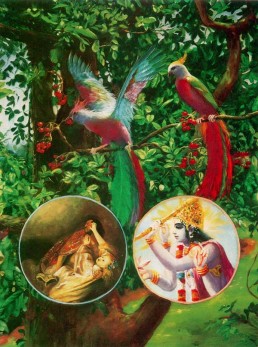Swami Chinmayananda
Swami Chinmayananda Commentary
I AM THE ALL-CONSUMING DEATH — Death, the leveller, brings even the sceptre and the crown to the level of the begging bowl and the staff. Every existing thing maintains its separativeness from all others only during its lifetime, due to its individual relationship with things and beings other than itself. After death, the wise and the fool, the good and the bad, the strong and the weak, the ruler and the ruled — all come to dust, levelled into a uniformity that recognises no distinction within itself.
I AM THE SOURCE OF ALL THAT IS TO BE — The Supreme is not merely the destroyer of all, reducing them into a lifeless commonality but, He is, certainly, the source of all new creations that are to come in the future. To conceive destruction, without taking into consideration its unavoidable accompaniment, i. e., the new construction, is but to insist upon a partial viewpoint. In a total and complete vision-of-life, taken as a whole, we find that the so called destruction is only a transformation, or modification, of the existing form of an object, or scheme of things, into something dissimilar and varying. Destruction leaves no total blank anywhere. When we view a wave separately, we may say that, after playing for a moment on the bosom of the ocean, it has destroyed itself, but if we view it from the standpoint of the ocean, for each wave which appears to have been destroyed, there are innumerable new waves that rise up, unnoticed by our limited powers of observation.
We find that Krishna is gathering these ideas against the contrast contained in his immediately prior statement, Altogether, the line stresses that the Infinite playing Itself, ceaselessly, and in repeated succession, the game of both destruction and construction, is, in fact, what we call as the finite-Universe.
FAME, FORTUNE, SPEECH, MEMORY, INTELLIGENCE, STEAD-FASTNESS, AND PATIENCE, AM I, OF THE FEMININE QUALITIES — The Sanskrit terms conveying these abstract nouns are all feminine in gender. Maybe the Lord means that if ever we find these qualities in women, we can perceive a clearer flicker of divinity than anywhere else. Again, the philosophical content of the line is perfect, and beyond all criticism. It is not said that the person having these qualities is divine. Whoever be the person, and whatever be his past, when on occasions he expresses these qualities, we can perceive a clearer vision of Life’s glory THROUGH HIM.
In short, these are the qualities which, when manifest, create such adjustments in the inner equipments in man, that we can perceive, through him, more clearly the awesome vitality of Life’s surge. As a transferred epithet, Lord the Self declares that among the feminine qualities, “I am any one of these, or all of them put together.”
THE LORD AGAIN GIVES FOUR MORE INDICATIONS TO MAKE THE SELF-INTRODUCTION CLEAR TO ARJUNA:
Adi Sankara Commentary
Death which is of two kinds-one destroying wealth, and the other destroying life-, [Here Ast. adds: tatra yah prana-harah sah (sarva-harah ucyate)-Among them, that which destroys life (is called sarva-harah).-Tr.] is called sarva-harah, the destroyer of all. I am that. This is the meaning. Or, the supreme God is the all-destroyer because He destroys everything during dissolution. I am He. And I am udbhavah, prosperity, eminence, and the means to it. Of whom? Bhavisyatam, of those destined to be prosperous, i.e. of those who are fit for attaining eminence. Narinam, of the feminine qualities; I am kirtih, fame; srih, beauty; vak, speech; smrtih, memory; medha, intelligence dhrtih, fortitude; and ksama, forbearance. I am these excellent feminine quialities, by coming to possess even a trace of which one considers himself successful.
The Bhagavad Gita with the commentary of Sri Sankaracharya – Translated by Alladi Mahadeva Sastry
Holy Geeta – Commentary by Swami Chinmayananda
The Bhagavad Gita by Eknath Easwaran – Best selling translation of the Bhagavad Gita
The Bhagavad Gita – Translation and Commentary by Swami Sivananda
Bhagavad Gita – Translation and Commentary by Bhaktivedanta Swami Prabupadha
Srimad Bhagavad Gita Chapter 10 – Verse 34 – 10.34 mrtyuh sarva harascaham – All Bhagavad Gita (Geeta) Verses in Sanskrit, English, Transliteration, Word Meaning, Translation, Audio, Shankara Bhashya, Adi Sankaracharya Commentary and Links to Videos by Swami Chinmayananda and others – 10-34

